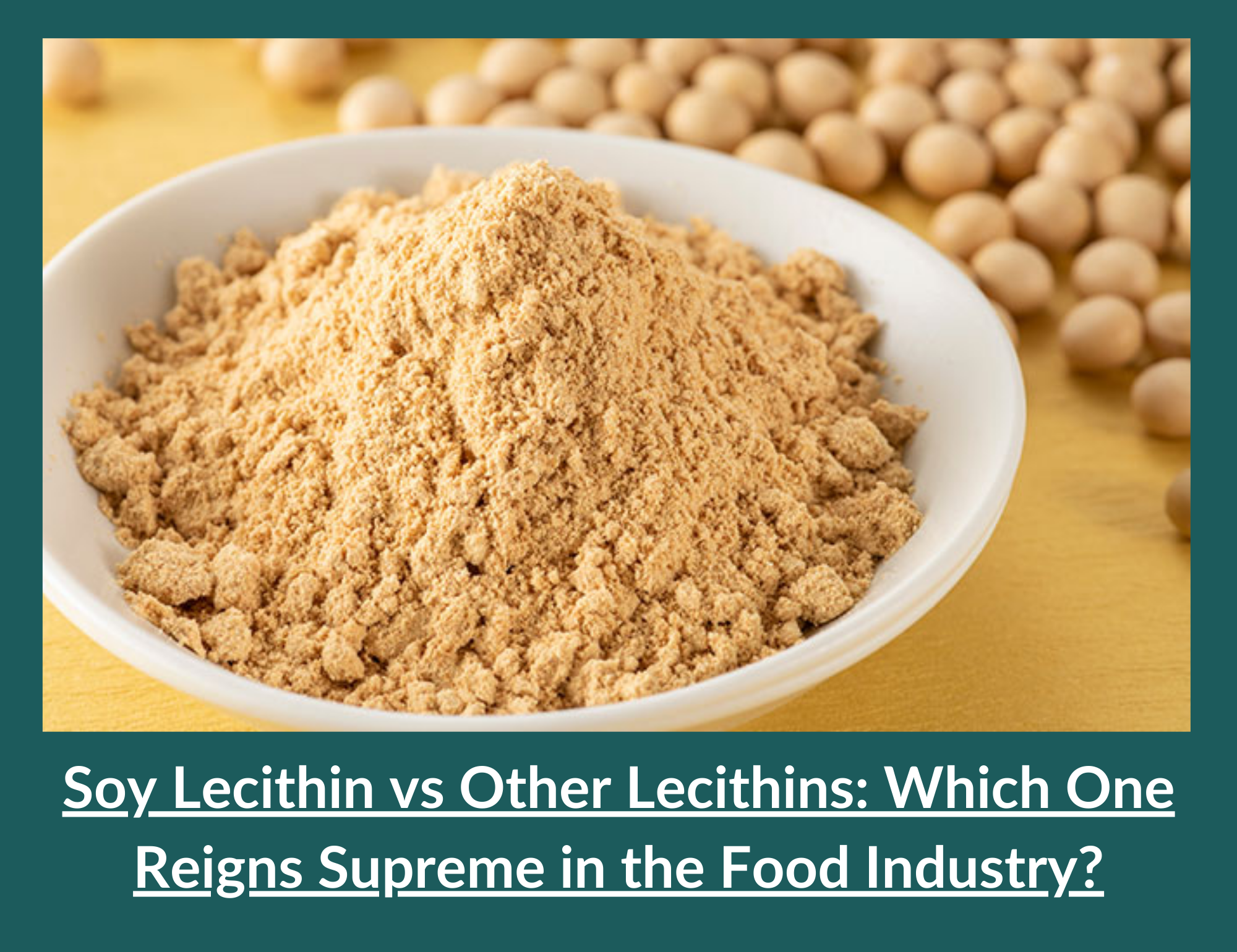Lecithins are a group of naturally occurring phospholipids commonly used as emulsifiers in various food and non-food products. Soy lecithin is one of the most commonly used lecithins due to its availability, cost-effectiveness, and functional properties.
However, there are other sources of lecithin, including egg, sunflower, and canola, each with unique properties and uses. In this article, we compare soy lecithin with other lecithins, looking at their properties and applications.
Types of Lecithins:

Soy Lecithin
It is a complex mixture of phospholipids extracted from soybean oil. It is used as an emulsifier, thickener, stabiliser, and dispersant in various food and non-food products. It is also used in pharmaceuticals, cosmetics, and industrial applications. It is a highly versatile ingredient that is cost-effective and readily available.
Egg Lecithin
Egg lecithin is extracted from egg yolks and is a highly pure source of lecithin. Egg lecithin has a higher phosphatidylcholine content than soy lecithin. It is often used as a natural emulsifier in high-end products such as chocolate and mayonnaise. Egg lecithin is also used in pharmaceuticals and cosmetics. However, egg lecithin is more expensive than soy lecithin and has a limited supply.
Sunflower Lecithin
Sunflower lecithin is extracted from sunflower seeds and is a non-GMO (not genetically engineered) and allergen-free alternative to soy lecithin. Sunflower lecithin has a higher phosphatidylcholine content than soy lecithin, making it a more potent source of choline, an essential nutrient for brain health. Sunflower lecithin is used as an emulsifier in various food and non-food products, including infant formula, salad dressings, and baked goods.
Canola Lecithin
Canola lecithin is extracted from canola oil and is a non-GMO and allergen-free alternative to soy lecithin. Canola lecithin has a similar phospholipid profile to soy lecithin. It is used as an emulsifier in various food and non-food products. It is also used in industrial applications, such as biodiesel production.
Comparison of Properties and Uses
Soy lecithin, egg lecithin, sunflower lecithin, and canola lecithin each have their unique properties and uses.
- Soy lecithin is the most commonly used lecithin due to its availability, cost-effectiveness, and versatility.
- Egg lecithin is a highly pure source of lecithin that is often used in high-end products but is more expensive and has a limited supply.
- Sunflower lecithin is a non-GMO and allergen-free alternative to soy lecithin that is a more potent source of choline.
- Canola lecithin is also a non-GMO and allergen-free alternative to soy lecithin that is commonly used in industrial applications.
Lecithins are a group of naturally occurring phospholipids commonly used as emulsifiers in various food and non-food products. Soy lecithin is the most commonly used lecithin due to its availability, cost-effectiveness, and versatility.
However, egg lecithin, sunflower lecithin, and canola lecithin have unique properties and uses, making them valuable alternatives to soy lecithin in certain applications.
Are you tired of sourcing Soy Lecithin the hard way? Look no further – EasyBuy is the hassle-free solution to your ingredient procurement needs.
With our single-step purchasing process, you’ll enjoy exceptional bargains and high-quality ingredients, all without the usual sourcing challenges. Make your purchase today and experience the convenience and efficiency that only EasyBuy can provide.
Citations
- Altenbach, S. B., Kothari, K. M., Tanaka, C. K., Hurkman, W. J., & Vensel, W. H. (2017). A comparison of two methods for enriching protein and reducing lipid content in soybean flour. Journal of food science and technology, 54(5), 1278-1286.
- Baumann, W. J. (2002). Sunflower lecithin. In Modified Starches: Properties and Uses (pp. 455-471). CRC Press.
- Câmara, F. L., de Menezes, C. B., & de Oliveira, L. E. (2017). Sunflower lecithin in ice cream production. Journal of food science and technology, 54(7), 2086-2093.
- Elisia, I., Kitts, D. D., & Przybylski, R. (2005). Comparative study on the antioxidant activity of commonly used polyphenols in vegetable oils. Journal of Agricultural and Food Chemistry, 53(17), 6605-6613.
- Fernandez, O., Acosta, G., Aguirre, A., & Palazolo, G. (2016). An innovative non-GMO canola lecithin emulsifier. Food and nutrition sciences, 7(13), 1047-1057.








